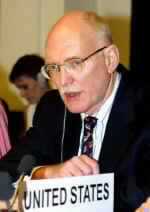GENEVA (AP) - The United States abandoned seven years of global talks on enforcing a treaty banning germ warfare Wednesday, surprising even its allies and prompting criticism for the latest in a string of go-it-alone U.S. positions.
The Bush administration insisted it still stood by the 1972 Biological Weapons Convention but said it had too many objections to a draft accord on enforcing the treaty, making further negotiations useless.
``In our assessment, the draft protocol would put national security and confidential business information at risk,'' U.S. chief delegate Donald A. Mahley told delegates at a negotiating forum in Geneva. (Read photo caption below)
The U.S. decision effectively kills the protocol, which negotiators worked out in seven years of talks and which requires full consensus to be approved. Nearly all the other 55 countries at the conference expressed support for the accord, although some had sought changes to be negotiated in the next three weeks.
The stance fueled criticism that the United States is taking isolationist positions on a number of multilateral issues, after Washington's rejection of a climate change accord and its doubts about other arms-control agreements.
U.N. Secretary-General Kofi Annan said the United States is ``practically standing alone in opposition to agreements that were broadly reached by just about everyone else,'' Annan's spokesman Fred Eckhard said. Annan hopes Washington will ``close ranks with the rest of the international community,'' Eckhard said.
At the Geneva conference, delegates were left looking for a way to salvage the accord.
When the convention was created during the Cold War, negotiators left out enforcement details because no one seriously thought any nation would try to use germ warfare.
The United States has pushed for a way to give the treaty teeth since Iraqi armaments discovered after the Gulf War showed it had been useless in stopping violators.
In Washington, a senior Bush administration official said at least 37 items in the protocol made it ``unacceptable'' to the United States, and all the concerns had also been voiced under President Clinton.
One of the U.S. objections was over inspections the protocol would allow into sites suspected of developing biological weapons.
The Bush administration has been criticized both at home and abroad for rejecting the Kyoto climate-change negotiations, demanding amendment of the Anti-Ballistic Missile treaty, and demanding the watering down of an agreement to curb trade in small arms.
The United States also faces controversy at a conference on racism next month in Durban, South Africa. Efforts to draw up an agenda for the session have been deadlocked over whether nations that benefited from slavery should formally apologize and pay compensation - which the United States opposes.
Those positions are seen as continuing an isolationist trend that included the U.S. Senate's 1999 refusal to ratify the nuclear test ban treaty and the Clinton administration's rejection of the 1997 treaty banning land mines.
Canada and South Africa said they regretted the U.S. decision at Geneva.
Cuba used stronger words. Ambassador Carlos Amat Fores said he hoped ``negotiations do not become a new hostage of the unilateralism that the world superpower has been assuming.''
PHOTO CAPTION:
U.S.ambassador and chief negotiator Donald A. Mahley addresses the 24th session of the ad hoc group of States Parties to the Biological Weapons Convention in Geneva, Switzerland on Wednesday, July 25, 2001. The United States rejects the anti-germ warfare enforcement accord. (AP Photo/Donald Stampfli)
- Jul 25 6:47 AM ET
- Author:
AP - Section:
WORLD HEADLINES


 Home
Home Discover Islam
Discover Islam Quran Recitations
Quran Recitations Lectures
Lectures
 Fatwa
Fatwa Articles
Articles Fiqh
Fiqh E-Books
E-Books Boys & Girls
Boys & Girls  Ramadan
Ramadan Fatwa Audios
Fatwa Audios Month of Mercy
Month of Mercy Women
Women Eed Al- Fitr
Eed Al- Fitr Food Recipes
Food Recipes Videos
Videos

 Prayer Times
Prayer Times












